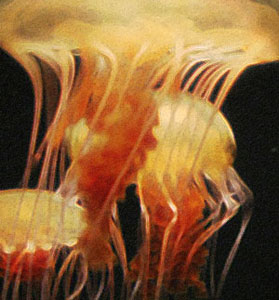When the shit went down Joe moved into the aquarium, and the security guard let him.
“I can’t give you any money,” said Joe.
The security guard looked the way he should: thick around, thinning hair, stuffed like a fist in his blue uniform.
He said to Joe, “What you do with your life is your own business.” He was progressive in his thinking, he said. “You want to live in the aquarium? Accept it. Own the thing.”
There was something kind in his eyes, thought Joe, and Joe wanted to tell him things, to hear that there was an answer to things, a reason. He said, “I’ll bet you wonder how a guy comes to live in an aquarium.”
“No,” said the guard, and smiled, “I wonder how a guy becomes a security guard.”
He handed Joe a mop and a set of keys with a shimmering dolphin key-chain. “Hide in the employee john during the day and during evening tours,” he said. “Pick up after yourself. Try not to provoke the larger mammals.”
Joe lived with the jellyfish. This seemed consistent with his non-aquarium life. He was tired all the time; he slept beneath the massive tank, to him a glowing, tapered nautical lava-lamp, ominous and sick with life. He woke to this, to the Blood Bellies and the Lion’s Manes and the Egg Yolk Jellies, their hypnotic bloat and gradual rise to the surface, tentacles drifting behind like curdled fly-strips; he climbed to the top of the tank and watched them idling there all neon mucous-y and he knew that he’d done the right thing.
There were others like him. Sal Casey camped out near the tide pools—or touch pools—a bit of throwaway half-filth that kept Sal entertained for hours. Come visit me at the touch pools! he would say. It’s always a party at the touch pools! Joe visited him sometimes for late night suppers of peanut butter crackers and Hostess cupcakes, and they named the hermit crabs, the limpets, the sea lemons. The purple sea urchin they called Harry.
“I had a boy called Harry once,” Sal said one night as he and Joe attempted to play checkers with the star fish. Joe nodded; he was not completely at ease with Sal, who was missing several teeth and laughed in a dry heaves sort of way, a way that was most disturbing when trumpeted through the halls of an empty aquarium.
“What happened to him?” asked Joe.
“He went into the water,” said Sal. He lifted a brown snail from the touch pool and turned it over dripping in his hand; its body reacted to the air, to the light, it wedged down into its shell, all shutter and flee, like a compressed heart or eye. “He went into the water.”
“I know what it’s like,” said Joe. “I know. I could tell you.”
Sal sniffed. He set the snail back into the water and said, “You gonna eat that cupcake?”
Blue lived with the otters. She was a girl Joe’s age and very beautiful in the face. She swam with the otters; they flocked around her like floating paparazzi; they pressed beneath her chin and slept beneath her arms and she plucked at them, put her fingers in their mouths, talked for them in funny voices. She said that when she died she would come back as an otter, because they were adorable but aloof. Everyone loved them but accepted the fact that they couldn’t be counted on.
One night Joe and Blue lay out on the plastic rocks below the track lighting and Joe propped up on one arm and said, “Let me tell you something.”
“All right,” said Blue.
Joe could barely breathe he was so excited. He told about the package that came to his house that day, to his old house, the one on land without the otters and rays. He told about who opened the package, and what was inside. He fell on his words and he picked up and said them again. There was a card with the package. The card read This is going to change your life. He’d found the card later, its edges charred as toast crusts, on the bottom step in the hallway. This is going to change your life. He explained the sound when the package was opened, like the end of something—the world, a song—from the other side of the house. He told about the walk from the office to the hallway and what he saw. About how, when he was standing there, the smoke alarm went off and how he jumped. Every car alarm in the neighborhood went off, he said, one after the other like a funeral procession.
When he was through he turned and looked at Blue she looked back at him and he was so grateful, so happy. An otter blew at her ear and she shooed it away.
She said, “Well.”
“Why are you here?” asked Joe. “Who left you? What did you lose?”
“I just like otters,” said Blue.
“Me, too,” said Joe. He covered his face with his hands and everything everywhere was that aquarium world, that lap of water, that bleached smell of salt.



 The core workshop of SmokeLong Fitness is all in writing, so you can take part from anywhere at anytime. We are excited about creating a supportive, consistent and structured environment for flash writers to work on their craft in a community. We are thrilled and proud to say that our workshop participants have won, placed, or been listed in every major flash competition. Community works.
The core workshop of SmokeLong Fitness is all in writing, so you can take part from anywhere at anytime. We are excited about creating a supportive, consistent and structured environment for flash writers to work on their craft in a community. We are thrilled and proud to say that our workshop participants have won, placed, or been listed in every major flash competition. Community works.